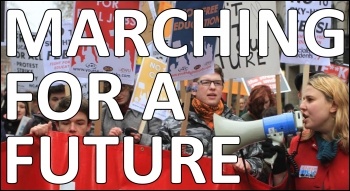posted on 4.10.11:
Marching for a future – interview with Jarrow marcher Paul Callanan of Youth Fight for Jobs
Paul Callanan, Youth Fight for Jobs national organiser, is one of the Jarrow marchers, marching the 330 miles from Jarrow to London to protest about youth unemployment.
posted on 28.9.11:
Marching for a future
Ben Robinson, YFJ national chair
On 1 October, Youth Fight for Jobs (YFJ) activists start a 330 mile march from Jarrow to London. Why? Because we’ve had enough, and we know that it doesn’t have to be this way.
Why should we let pro-big business politicians get away with condemning the young and the unemployed as a ‘feral underclass’? Why should millions of public sector workers have to strike against working longer while the job rejection letters pile up for a generation?
While universities spend millions on rebranding, new students have to live in caravans and temporary accommodation because there aren’t enough affordable halls.
The government has cut EMA student payments to save a measly £500 million but fritters away huge amounts on consultants and PFI schemes.
We’re being made to pay for a crisis not of our making. And this isn’t the first time in history either.
The great depression of the 1930s saw our grandparents’ and great grandparents’ living standards decimated.
But there was also mass resistance then. In 1936, hundreds of unemployed workers marched from their homes in Jarrow to London. It’s in the traditions of such protests that YFJ is marching today.
No choice
The 1930s were a period of mass unemployment and few public services, with the vast majority of people forced into being dependent on the charity of the rich.
It is exactly these conditions that the Con-Dem coalition is seeking to bring back into existence. They say that one man’s rubbish is another man’s treasure, but there are few so low as to warrant comparison with Clegg and Cameron.
Young people have no choice but to fight back. In Spain, Greece, Chile, Egypt, Yemen and elsewhere young people are and have been to the fore of mass movements and revolutions.
The Spanish movement of unemployed and angry young people is organising similar ‘long marches’.
In Britain too young people have moved into action with the student movement at the end of 2010 and the thousands of new young trade union members taking part in demonstrations and strikes.
The riots over the summer showed that there is huge anger building up. The paths traditionally seen as routes out of misery and desperation turn out to all lead to dead ends.
Graduate unemployment has risen dramatically over the last few years, and half of those on internships are receiving no pay whatsoever. Fees of up to £9,000 are a massive deterrent to all but the richest.
With the abolition of EMA college enrolment has already slowed down significantly. Government plans will push many 14-18 year olds into years of meaningless work experience. This will only add fuel to the fire.
For those out of work, there are half a million jobs for over two and a half million unemployed – but even this national average does not reveal the full scale of the problem.
In some areas there can be over 50 Jobseeker’s Allowance (JSA) recipients chasing every single job.
The government’s plans are, unbelievably, to make these people work for free through ‘work experience’! Not only will this free labour be used by bosses to increase their profits, but will also lead to fewer paid jobs available.
Cuts in careers advice, such as Connexions, and youth clubs mean young people have literally nowhere to go.
After anger exploded on the high streets in August, a YFJ activist asked a young man in Tottenham where his nearest youth club was. Pointing at the wall he was sitting on, “this is my youth club” was his reply!
Mass movement
But the riots only gave the government an excuse to heap more misery on the shoulders of the most-burdened.
Instead we have to work together to build a positive movement that will tackle the root causes of the conditions we face.
In doing that we have to use the best ideas of the past and the best ideas of today and tomorrow. With these and with a clear message, we can defeat these attacks and defeat this government.
We’re marching to demand the reopening of all closed youth services, creating jobs and offering a vital lifeline for young people.
For a restoration of EMA and access to a decent education for all. For ‘workfare’ schemes to be scrapped, for a day’s pay for a day’s work.
We demand that the government creates jobs rather than destroying them. During the course of the march youth unemployment is likely to go over one million.
Public services are understaffed and facing cuts and there are millions of talented young people who are desperate to put their skills to use.
As a start, a programme of building and restoring high-quality council housing would end the cramped conditions that many young people live in and create a huge number of jobs.
These are big demands. But battles like this are won all the time on a local level. Just recently, a mass campaign in Renfrewshire in Scotland, including a rally of a thousand and a successful ballot for strike action defeated plans to cut 60 teachers’ jobs.
The trade unions have massive potential power. When the RMT and TSSA have taken strike action, they’ve brought the City of London to a standstill.
Support
Since we announced the Jarrow march in February we have received the support of hundreds of trade union branches, anti-cuts groups, political organisations, student activists and many, many of those individuals who aren’t organised yet.
We have received the support of eight national trade unions – Unite, UCU, Bectu, CWU, TSSA, RMT, PCS and the FBU.
YFJ supporters have been on the TV, radio, newspapers and the internet. And this is just the start.
During the march, thousands will take part in local rallies and demonstrations, culminating in a big demonstration on 5 November, when we arrive in London.
But that won’t be the end of the campaign. Afterwards we want to build on all the links we have made and all the young people that we meet during the course of the march.
We need to develop mass campaigns around the country, taking up the demands of the march and building a movement that’ll force the government to listen to the powerful voice of young people, linking it in with the trade unions.
The 30 November could see three to four million workers taking strike action to defend pensions.
Youth Fight for Jobs will be campaigning for support for these strikes, among young workers, the unemployed as well as among university and college students.
- 973,000 16-24 year olds are unemployed and this figure is likely to go over one million during the course of the Jarrow march.
- An estimated 750,000 will lose their jobs as a result of public sector cuts, never mind the knock-on effect to private sector jobs.
- After a scramble to avoid next year’s fee rise, 200,000 missed out on a university place this year because of the cap on student places.
- College enrolment across the country is down this year, almost certainly because of the scrapping of EMA.
- The average graduate debt for students who start university in 2012 is expected to be £53,400.
- The Work Programme and schemes like it are being used to force unemployed people to work (often for private businesses) for no more than their usual poverty benefits.
- Over £100 million of cuts are set to be made to youth services over the next three years – the worst hit service according to many councils.
- Under-18s can’t claim Jobseeker’s Allowance or many other benefits. Youth rates are generally vastly lower.
- 22% of 18-34 year olds have had to move back in with or stay living with parents because of the cost of renting or buying their own home. 20% are delaying having children until they can afford this.
- Nearly five million people in England are on council house waiting lists and the government plans to cut funds for building social housing by 63% while 200,000 construction workers are unemployed.









